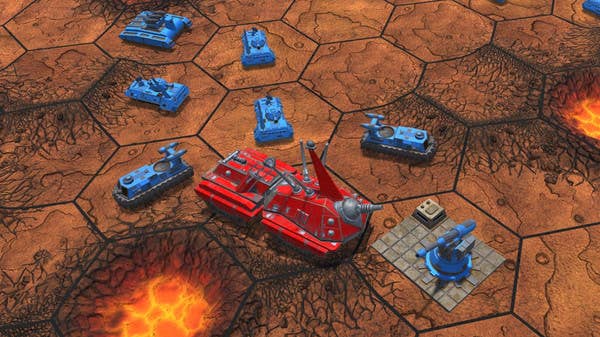“There is no magic formula” for getting noticed on Steam
Auroch Digital director Tomas Rawlings discusses the hard work that goes into surviving on Valve's marketplace
Steam is arguably the most challenging market for indie developers to release games into, yet while the barriers to entry remain low it will continue to be the go-to platform for studios starting out.
Perhaps the biggest challenge developers face is the sheer volume of new releases and the alarming rate at which this is increasing. There were over 7,600 titles added to Steam in 2017, a 53 per cent leap from the 5,006 released in 2016, which was in itself a 69% rise over 2015... and so on.
With this flood of releases unlikely to slow, Auroch Digital design director Tomas Rawlings is giving a talk at Develop:Brighton tomorrow, cheerily titled 'The Steampocalypse: A Survival Guide'. We caught up with Rawlings ahead of the conference to find out what impact the expanding Steam catalogue is having on developers.

"From my experience, it is exerting a downward pressure on the number of sales, and the average value of those sales as it's also pushing the average price down," he tells GamesIndustry.biz.
"The core impact of those combined pressures is making indie development much riskier and less sustainable. What can be done? That's a harder question."
He will explore the potential answers in his talk, but the most important advice he offers it to plan ahead.
"That means planning more on where to position your game - pricing, audience, etc - more planning of how to promote the game, more on planning for the release, and more on contingency planning for after a game is out. Planning."
This is vital, he stresses, as it's unlikely Valve will do anything to curtail the glut of new releases on its platform any time soon. 2017 was the firm's biggest year for sales, with more users than ever buying games - why would Valve want to endanger this trend?
Instead, Rawlings argues it's in Valve's interest to "take early action on the quality of games on the store" - although this is something the company seemingly has no intention of doing.
"We've seen on Facebook what the impact of a lower quality of content does," he warns. "Players start to switch off and go elsewhere, and while that starts as a trickle it can easily become a flood.
"If [Valve] upped the cost of Steam Direct to something like $500 or even $1,000, it would make asset flipping and bottom-of-the-barrel games much less profitable"
"What should they do? There's a bigger debate to be had about the types of games and content on Steam, but right now if they upped the cost of Steam Direct to something like $500 or even $1,000, that's not going to deter a small developer who's put years of work into a passion project - but it is going to make asset flipping and bottom-of-the-barrel games much less profitable."
Bristol-based Auroch Digital has its own share of war stories from releasing on Steam, but Rawlings notes that the studio is fortunately not dependent on that income thanks to a mix of work-for-hire, consultancy and partnership projects.
Perhaps one of the studio's most recent success stories on Valve's platform was Ogre, an adaptation of the Steve Jackson Games' tabletop game. This was released last year shortly after the launch of Steam Direct - "right into the maw of the biggest uptick in new releases we've ever seen" - but was able to place well in charts, has an 80 per cent player rating and is "still selling okay now".
"As we approached release in late 2017 and saw what was happening on the store, I was getting really worried for our own 'Auroch-ageddon' but when it came to it, our planning and hard work managed to avoid that," he said.
"Had we not have released into that level of competition it would have been better, sure. But compared to what 'the new normal' is in terms of numbers, it went better than it did for most."

Rawlings is also quick to point to other success stories - including Tooth and Tail, Battletech and Bomber Crew - as further examples of how it is still possible for new and emerging studios to achieve moderate success on Steam, but warns that the games themselves were not enough to guarantee this.
"A quality game alone is not going to rise above the dross," he says. "All the examples I gave were good games with good marketing operations behind them and developers need to put as much energy into getting noticed as they put into making the game itself.
"There is no magic formula for how you get noticed. There will be lots of smaller things that you do that together break through the noise"
"There is no magic formula for how you get noticed. There will be lots of smaller things that you do that together break through the noise. For example, we're exploring podcasts as a way to connect to potential players for Mars Horizon."
Unfortunately, it all still comes down to trying to secure a position in the charts or on Steam's front page. While the ever-expanding world of social media means there is a multitude of channels through which developers can reach their audience and direct them towards a game's store page, this in itself is not a sustainable form of marketing.
"Unless you're lucky enough for that posting to go viral, no," Rawlings explains. "Like most stores, Steam is a feed-forward loop, which means that they work on amplification.
"So if on release you're selling a lot of games, you chart. Being on the charts gives more eyeballs on your game, meaning more sales. More sales means more visibility, more visibility means more sales, and so on. Even if you're lucky enough to have many thousands of followers on social media, that alone is not going to drive that initial spike of visibility."
Finally, Rawlings stresses that there are other platforms to explore and that developers will benefit from getting their game into as many outlets as possible. On the PC front, he highlights Itch.io, Twitch and the upcoming Kartridge platform from Kongregate, while also observing there are plenty of opportunities for indies on the home consoles.
"Those still have a reputation for quality and a higher entry bar - getting dev kits, for example - and that means the same issues are not yet in these spaces," he acknowledges.
"But all three of the console makers have been pretty good about opening up to indies. There are always more things that can be done of course, but it's really positive right now. I've been at Xbox and PlayStation dev events recently and found both to be really open and happy to help."
Rawlings will be giving his talk at Develop:Brighton tomorrow morning. If you've yet to sign up for a pass, you can still do so - and GamesIndustry.biz readers get a 10% discount by using the code: IDCQXO.
Check out our guide to the must-see sessions of the week right here.
GamesIndustry.biz is an official media partner for Develop:Brighton.
